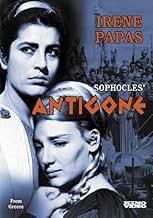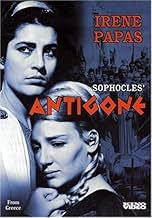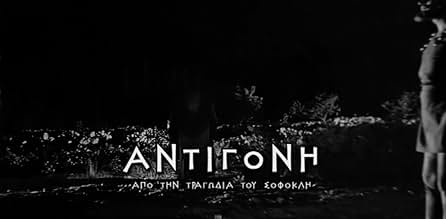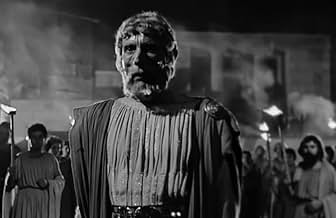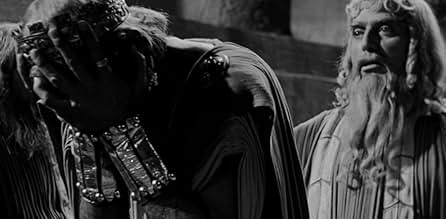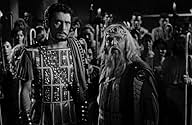Agrega una trama en tu idiomaAntigone defies her uncle's decree that her traitorous brother should go unburied and therefore find no rest in the afterlife; however, her actions have tragic consequences.Antigone defies her uncle's decree that her traitorous brother should go unburied and therefore find no rest in the afterlife; however, her actions have tragic consequences.Antigone defies her uncle's decree that her traitorous brother should go unburied and therefore find no rest in the afterlife; however, her actions have tragic consequences.
- Dirección
- Guionistas
- Elenco
- Premios
- 3 premios ganados y 1 nominación en total
Yorgos Karetas
- Elder of Thebes
- (as Giorgos Karetas)
Mimis Rougeris
- Elder of Thebes
- (as Dimitris Rougeris)
- Dirección
- Guionistas
- Todo el elenco y el equipo
- Producción, taquilla y más en IMDbPro
Opiniones destacadas
Antigone represents the epitome of philosophical thought in antiquity. The ruler in Creon is set opposite to the loyal sister in Antigone. The ethical dilemma presented in the film is much like Plato's works: Euthyphro and Republic. Creon, as the ruler Thebes, thinks it just to not bury the fallen enemies near the city as it would disgrace the city. Antigone on the other hand feels it just to her fallen brother, a confederate to the previous regime, that he be given a proper burial in regard to his and Antigone's beliefs in the Gods.
The conflict gets its genesis from a varying view of what is just or the right thing to do. Take Plato's dialogue between Socrates and Euthyphro in Euthyphro. Euthyphro explains to Socrates that something pious (just, good) is something unanimously loved by the Gods. Socrates raises the question as to whether the gods love the pious because it is the pious or whether something pious is only pious because it is loved by the gods. The circular dilemma present by Euthyphro brings a question to Antigone. Is she right for wanting her brother buried and disrupting edicts by Creon's rule? Is her pious belief in the Gods something she ought to uphold? Does the good or justice in her brother's burial supersede Creon's rule? Additionally, in Plato's Republic Thraseymachus explains to Socrates that the just is the advantage of the stronger, and that it is just to obey one's rulers. Socrates argues against this conclusion but with weak premises. For Euthyphro, Antigone would be justified in wanting her brother buried in his religious fashion which would dictate his corpse not rotting in the woods. Thraseymachus on the other hand would say that the justice resides in the ruler, Creon, for better or worse. Which is right?
The conflict gets its genesis from a varying view of what is just or the right thing to do. Take Plato's dialogue between Socrates and Euthyphro in Euthyphro. Euthyphro explains to Socrates that something pious (just, good) is something unanimously loved by the Gods. Socrates raises the question as to whether the gods love the pious because it is the pious or whether something pious is only pious because it is loved by the gods. The circular dilemma present by Euthyphro brings a question to Antigone. Is she right for wanting her brother buried and disrupting edicts by Creon's rule? Is her pious belief in the Gods something she ought to uphold? Does the good or justice in her brother's burial supersede Creon's rule? Additionally, in Plato's Republic Thraseymachus explains to Socrates that the just is the advantage of the stronger, and that it is just to obey one's rulers. Socrates argues against this conclusion but with weak premises. For Euthyphro, Antigone would be justified in wanting her brother buried in his religious fashion which would dictate his corpse not rotting in the woods. Thraseymachus on the other hand would say that the justice resides in the ruler, Creon, for better or worse. Which is right?
It is true the more knowledge of the play by Sophocles and of Greek plays, in general, the more you can appreciate this rendition. However, the interesting thing about this presentation is you can start from ground zero and come away with everything the tragedy is about. Even though the story is well known, I will not go through it in case this is your first time.
There is an introduction to bring you up to date from Oedipus through his descendants and history to today where you meet Antigone and her sister Ismene. Their decisions are partially ordained and those of the new king Creon decide the outcome. You may find yourself quoting this play as you would Shakespeare's plays.
The reason for watching it multiple times is the first time around you may be busy reading the subtitles of which some flash and are gone. The second time around you may keep an eye on the acting. Third, you will get used to the Greek and even if you do not speak it, you will find much filled in that was not subtitled. By now you will be hooked and have to watch it periodically.
There is an introduction to bring you up to date from Oedipus through his descendants and history to today where you meet Antigone and her sister Ismene. Their decisions are partially ordained and those of the new king Creon decide the outcome. You may find yourself quoting this play as you would Shakespeare's plays.
The reason for watching it multiple times is the first time around you may be busy reading the subtitles of which some flash and are gone. The second time around you may keep an eye on the acting. Third, you will get used to the Greek and even if you do not speak it, you will find much filled in that was not subtitled. By now you will be hooked and have to watch it periodically.
...Or, Two Rights Make A Wrong. Over the years I've seen many versions of Antigone, both films and TV and even read two translations of the timeless tale by Sophocles but I was mainly interested in seeing this one as I've never heard it spoken in Greek before. Can't understand a word; whether it makes it more authentic or not is debatable - and after digesting all the concepts in the play whether you need another idea to debate is also debatable – but it certainly adds another dimension.
Strong minded woman Antigone wants to bury her brother Polyneices returned from exile who kills but is killed in battle by her other brother Eteocles who is feted as Thebes' saviour and given a hero's burial. Wilful King Creon decrees death to anyone honourably burying the traitor Polyneices bringing calamity and endless moral dilemmas for all concerned. Antigone is excellently played by Irene Papas, fresh from The Guns of Navarone the year before. This is Sophocles whizzed through in eighty minutes, concentrating on this wilfulness, pride and refusal to listen either to their gods, counsel or commonsense. It's been a salutary lesson for all people but especially despots and politicians of all eras; some wilfully blind leaders lead nations to war and destruction with their gods on their side and in the aftermath justify themselves even if it means black must be white and vv too of course. The ever modern tragedies are that the despots and politicians never heed the lessons in here though and indeed that ordinary people still desire shepherds to lead them. Without going into any of the moral and ethical points raised (plenty mentioned in other comments here) as a film it's a reasonable effort and well acted and engrossing enough although I'd always imagined Thebes to be a little grander somehow. If you're still unsure: memorable, lots to chew over but absolutely no laughs.
Strong minded woman Antigone wants to bury her brother Polyneices returned from exile who kills but is killed in battle by her other brother Eteocles who is feted as Thebes' saviour and given a hero's burial. Wilful King Creon decrees death to anyone honourably burying the traitor Polyneices bringing calamity and endless moral dilemmas for all concerned. Antigone is excellently played by Irene Papas, fresh from The Guns of Navarone the year before. This is Sophocles whizzed through in eighty minutes, concentrating on this wilfulness, pride and refusal to listen either to their gods, counsel or commonsense. It's been a salutary lesson for all people but especially despots and politicians of all eras; some wilfully blind leaders lead nations to war and destruction with their gods on their side and in the aftermath justify themselves even if it means black must be white and vv too of course. The ever modern tragedies are that the despots and politicians never heed the lessons in here though and indeed that ordinary people still desire shepherds to lead them. Without going into any of the moral and ethical points raised (plenty mentioned in other comments here) as a film it's a reasonable effort and well acted and engrossing enough although I'd always imagined Thebes to be a little grander somehow. If you're still unsure: memorable, lots to chew over but absolutely no laughs.
Most people who watch this film will be doing it in order to see an example of a classic Greek tragedy. They will be satisfied. It is dignified, stately, and absolutely dripping with fate, destiny, and tragedy.
But what if you are more like an average movie-goer? Does it hold up under more normal criteria? I think it does to some extent, but not particularly well. The plot is started at the very beginning of the opening scene as Antigone expresses her determination to bury her dead brother, and everything else follows inevitably - the entire story is plot-driven. It's a rather simple plot, but it does carry you along. I'm not sure there's a lot more that's really compelling about the film. It's pretty stagey, with actors and extras forming nice patterns, as if lining up with chalk lines on the floor. Although there are a number of small processions and such, this is not a costume epic with a cast of thousands and crane shots filling the screen with colourful eye candy. It's filmed in black and white. Is the acting good? Sure, but bear in mind that the range of emotions is quite limited, and characters pretty much talk in set speeches. They do imbue their dignified speeches with the correct emotions and make them sound sincere.
But, to be honest, I don't think you would recommend this film to anyone unless they had a pre-existing interest in classical Greek drama.
But what if you are more like an average movie-goer? Does it hold up under more normal criteria? I think it does to some extent, but not particularly well. The plot is started at the very beginning of the opening scene as Antigone expresses her determination to bury her dead brother, and everything else follows inevitably - the entire story is plot-driven. It's a rather simple plot, but it does carry you along. I'm not sure there's a lot more that's really compelling about the film. It's pretty stagey, with actors and extras forming nice patterns, as if lining up with chalk lines on the floor. Although there are a number of small processions and such, this is not a costume epic with a cast of thousands and crane shots filling the screen with colourful eye candy. It's filmed in black and white. Is the acting good? Sure, but bear in mind that the range of emotions is quite limited, and characters pretty much talk in set speeches. They do imbue their dignified speeches with the correct emotions and make them sound sincere.
But, to be honest, I don't think you would recommend this film to anyone unless they had a pre-existing interest in classical Greek drama.
The play 'Antigone', written by Sophocles in 441 BC is not just a great piece of theatre but also raises political, ethical and philosophical issues which render it timeless. The blind Tiresias upbraids King Creon with 'All tyrants are gluttons for their ill-gotten power' and warns him that he will pay a terrible price for having denied Polyneices burial and condemning Antigone to entombment.
Athenians at the time would certainly have related to the folly of tyranny.
Unlike most 'absolute rulers' he relents but alas too late.
This is a very accomplshed adaptation by writer/director Yorgos Tzavallas with a fine score by Argyris Kournadis.
The cast is uniformly excellent. The striking Irene Papas, no stranger to tragic Greek heroines on both stage and screen, deservedly won an award at the Berlin International Film Festival for her performance as Antigone. Her character arouses our sympathy but one should not forget that her grim fate and the play's tragedy stems as much from her own stubbornness as from Creon's intractability. Manos Katrakis is absolutely stupendous as Creon. He too was recognised for his performance at the International Film Festival in San Francisco. Papas and Katrakis went on to excel in 'Electra' for Cacoyannis two years later.
One does not have to be a classical scholar to appreciate this first class film but should seeing it arouse ones interest in the wonders of Greek tragedy then it has more than served its purpose.
¿Sabías que…?
- TriviaThe movie sold 43,705 tickets. It came in 12th out of 68 movies.
- ConexionesReferenced in Dinos Katsouridis: Mia zoi san sinema (2012)
Selecciones populares
Inicia sesión para calificar y agrega a la lista de videos para obtener recomendaciones personalizadas
- How long is Antigone?Con tecnología de Alexa
Detalles
- Tiempo de ejecución
- 1h 33min(93 min)
- Color
- Mezcla de sonido
- Relación de aspecto
- 1.37 : 1
Contribuir a esta página
Sugiere una edición o agrega el contenido que falta

